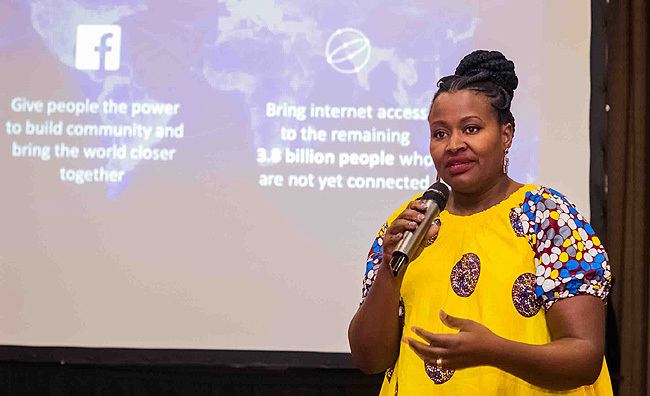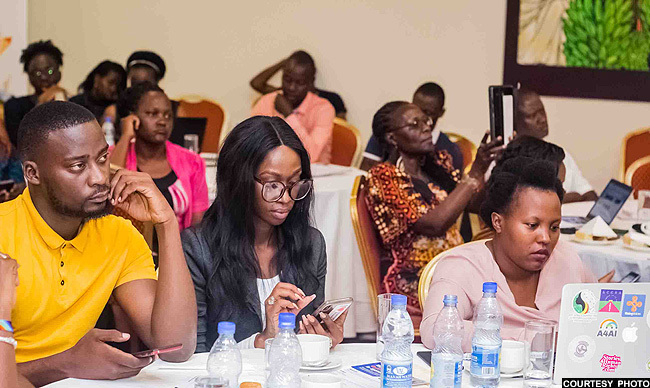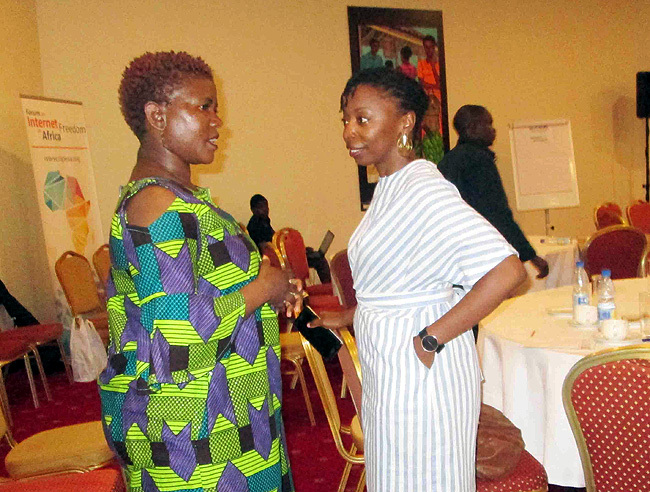Are women still depicted as the weaker sex online?
“Facebook does not allow impersonation, attack on president and an individual.
COMMUNICATIONS
KAMPALA - Bloggers and internet activists have urged people to exercise a sense of sisterhood and brotherhood and practise digital phone etiquette to protect their images when using the internet.
This, they argue, should help steer them clear of potentially being victimised or being caught up on the wrong side of the law.
Juliet Nanfuka from Collaboration on International ICT Policy for East and Southern Africa (CIPESA) said that to fight gender-based violence online, continuous sensitisation and engagement of the public is needed.
Speaking at a women‘s online safety dialogue in Kampala on Wednesday, she said such interventions will build capacity in the understanding of gender-based cyber violence.
The tools to combat the vice will also be generated, she added.
 Mercy Ndegwa said Facebook does not tolerate impersonation. (Credit: Rachael Nabisubi)
Mercy Ndegwa said Facebook does not tolerate impersonation. (Credit: Rachael Nabisubi)
Mercy Ndegwa, the head of public policy, East Africa at Facebook, said while Facebook allows freedom of speech and expression, it does not allow the attack on presidents and on an individual.
The social media firm does not tolerate impersonation as well, she added. "However, Facebook can look out for context and have carve-outs for satire and humour."
Ndegwa said the Facebook policy has evolved over time to include gender issues and offers channels for users to report disturbing content.
In her discourse, Leah Eryenyu from Akina Mama wa Africa said that much as the online space is important for women to contribute, participate and enjoy themselves, there is need to protection and regulation measures.
Short of that, manipulative users go on rampage.
"Being part of the internet and the social media gives them the vigour and freedom to freely express themselves without being controlled," said Eryenyu. "However, the freedom should be governed by rules and regulations to ensure safety and orderliness within the community."
She said safety of the online community can be realised with such measures as a sexual offences bill that specifically targets issues of women, including being sexually violated online, nude photos leaked and women‘s body parts denigrated.
"On the other hand, the challenge is that the laws are further used to victimise women or to state tools to serve their own interests but not to necessarily protect people," said Eryenyu.
 Ugandan socialite Judith Heard, one of the victims of online gender-based violence, attended the dialogue. (Courtesy photo)
Ugandan socialite Judith Heard, one of the victims of online gender-based violence, attended the dialogue. (Courtesy photo)
Eryenyu's argument is that there are fewer women who have internalised the cultures and behaviours that they consider to be socially acceptable and detrimental to women.
She, therefore, called for appointment of more female figures who have learnt power and gender dynamics such that they can ppose laws that they deem harmful to women.
Jimmy Haguma, who is in charge of cyber crime at Uganda Police, said as people continue embracing and appreciating technological advancements to connect worldwide, people should shun online avatars.
 Juliet Nanfuka (right) interacts with Rosebell Kagumire from African Feminism. (Credit: Racheal Nabisubi)
Juliet Nanfuka (right) interacts with Rosebell Kagumire from African Feminism. (Credit: Racheal Nabisubi) Online avatars are profiles created to attain a following.
Haguma cautioned people to understand the space in which they are communicating and should avoid clicking on just about any random link because some of them are malicious and could be harmful to their gadgets or online space.
Bernard Sabiti, the senior programme officer at Development Research & Training, called for compilation of data using modern methods rather than rudimentary methods to gather accurate and timely crime report statistics.